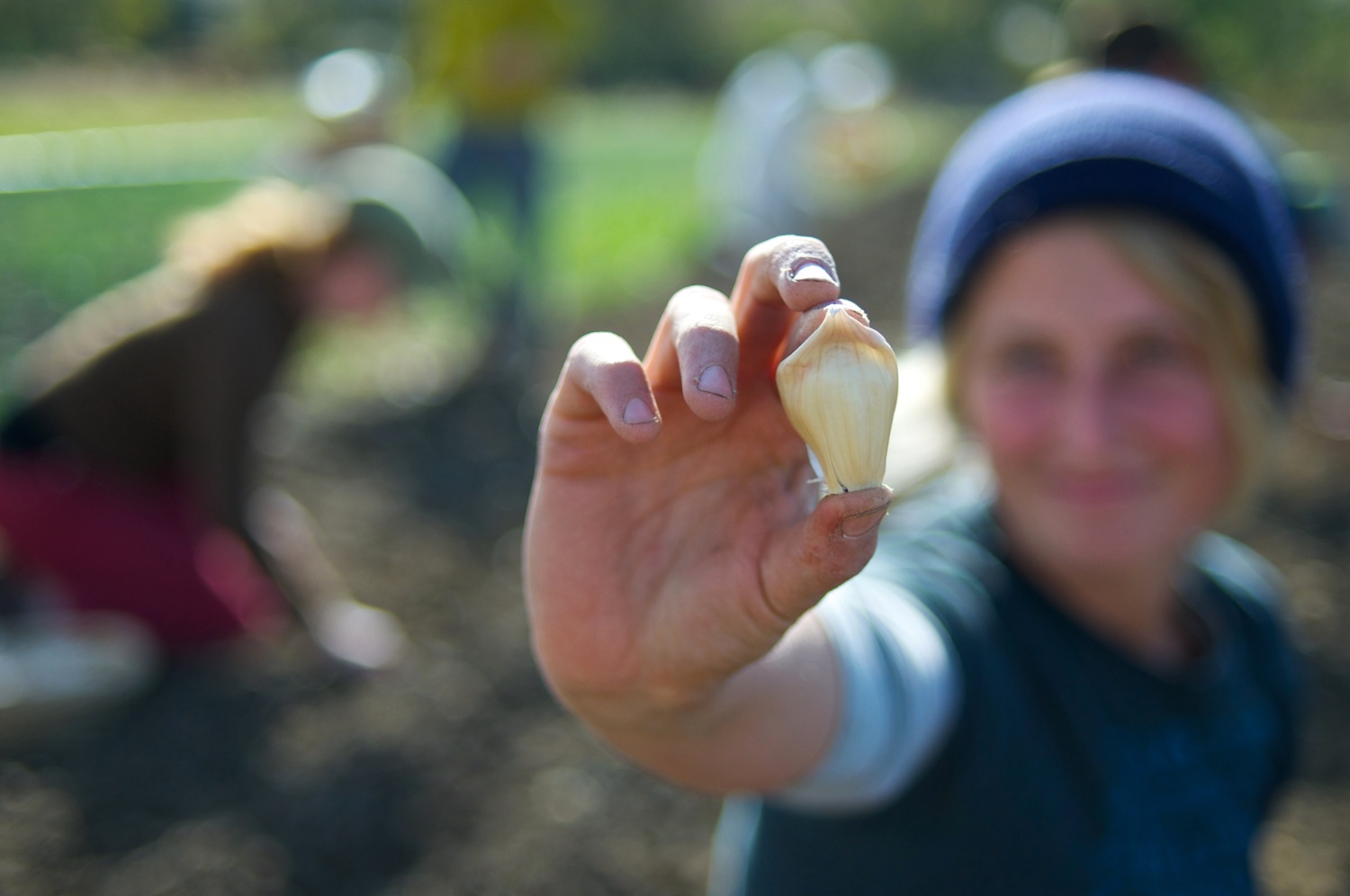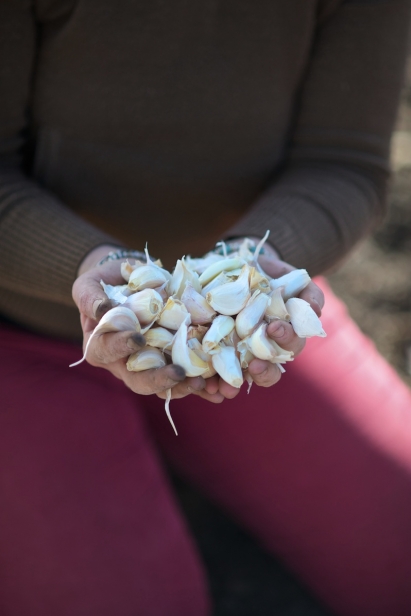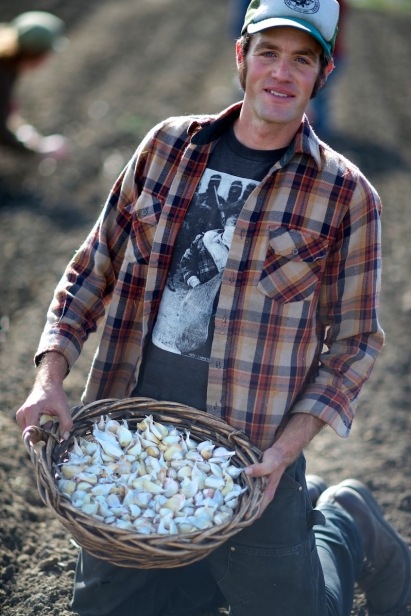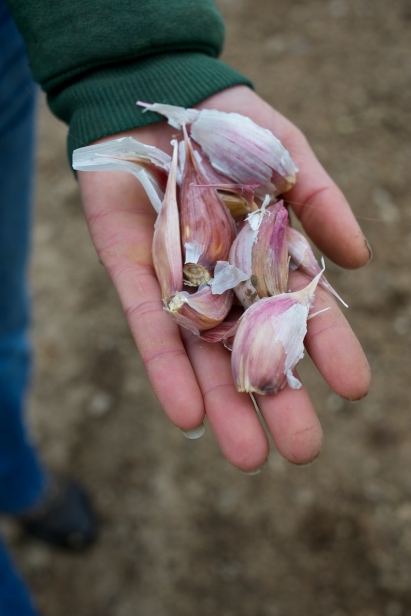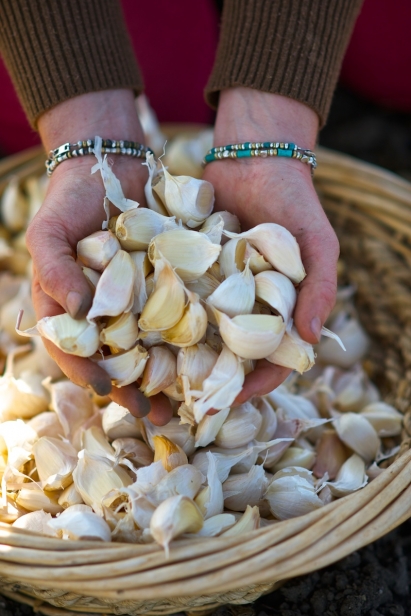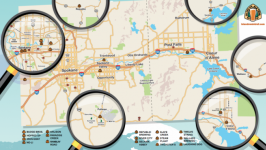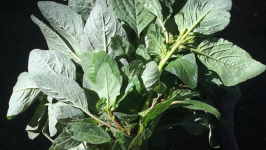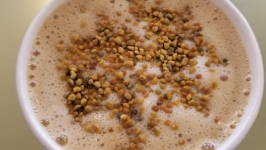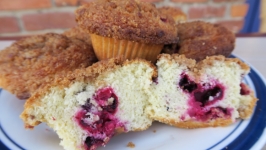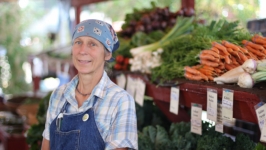Allium Games: Local Farmers Run the Great Idaho Garlic Gauntlet
A brand new variety of garlic is hitting shelves for planting this fall, thanks to the efforts of Boise Farmer Lori Bevan of Field Goods Farm. The variety, which Bevan named Uzbek Porcelain due to the bulb’s origins in Uzbekistan, has never before been available to gardeners in the United States.
Five years ago, the quiet, somewhat reticent Bevan began the journey to introduce a handful of unnamed garlic varieties to the world by multiplying the cloves year after year on her small, one-acre urban farm. Rather than starting her garlic-growing career by simply buying a large quantity of the few garlic seed varieties that were already available in the area by a single supplier out of Rupert, Bevan instead began the hunt for new varieties that could add distinction to her small operation.
“I kind of felt like that was cheating,” she said shyly, running her hands over the long beds of rare garlic varieties that flanked her, waist high, on either side, “to just buy [the Rupert supplier’s] garlic and multiply it.” Bevan’s dad, Glen, who owns the property next to her farm, is fond of teasing her: “Lori’s motto? ‘Why do it the easy way when you can do it the hard way?’” And so, true to form, she dived headfirst into the bureaucratic headache that is the allium industry in Idaho.
The allium industry, which includes mostly onions, is big—the fourth largest in the nation— and with so many growers dependent on it, there’s a lot riding on its continued success. Curious as it may seem in our don’t-you-tell-ME-what-to-do political climate, Idahoans are fond of making strict rules about who can grow what, with which seeds, for crops crucial to our large agricultural export market. Potatoes, beans, grapes, and alliums all have a laundry list of laws and protocols that accompany their planting.
In order for Bevan to bring a new variety of garlic to the quarantine area, which includes all of Southwestern Idaho, it first had to be sent to the University of Idaho (U of I) lab in Moscow for testing. At the lab, each clove is sprouted and tested for onion white rot, the nasty fungus that spawned the quarantine back in the ’80s when a commercial onion grower came down with a bad outbreak.
“Once [onion white rot] gets in a field or a garden, you’ve got it almost indefinitely,” said the Idaho State Department of Agriculture’s (ISDA) Mike Cooper. “The more you grow onions or garlic in the field, the more the inoculate builds up, and it gets worse and worse.”
At first, Bevan figured she’d just bring in varieties that were popular in other areas with fewer restrictions, through the U of I testing program. That is, until she stumbled upon Washington State University’s Barbara Hellier, who convinced Bevan to try something even more daring.
Hellier curates a collection of 1,123 accessions of alliums and she convinced Bevan to allow her to select several of the rare, unknown garlic accessions she thought held the most promise for commercial production in our area, based not only on the varieties’ suitability for our specific conditions, but also for their ability to survive and pass the U of I lab tests.
Hellier and Bevan decided on seven varieties and Bevan forked over a whopping $2 per clove to the U of I to perform the tests, paying hundreds of dollars for what amounted to a few handfuls of garlic cloves. Greatly weakened after testing, Bevan saw severe losses the first winter she planted the tested cloves. In fact, only one bulb of variety 12838 survived the winter.
For the last four years, Bevan has patiently stewarded these special varieties, growing out, selecting, and replanting the cloves each year to increase the quantity and quality of each. From her one 12838 bulb, she’s now up to seven and a half pounds.
This year the noticeably robust Uzbek Porcelain—known as Z001B in the repository— will see its commercial debut. In Bevan’s field, it stood at least a foot taller than W612838 in the bed next to it. Next year, she’ll have enough to introduce another new variety to United States markets—an unnamed softneck from Bulgaria.
These quarantine laws, while at first appearing to limit opportunity for small farmers, are also remarkably cooperative. They bring growers together to protect our area from onion white rot. And once the varieties are here, the annual certification process is quite affordable, not to mention painless.
Another small garlic grower, Justin Moore of Fiddler’s Green Farm in Boise, has found a large market for his certified white rot-free garlic outside the state. Market growers around the country see Idaho as a safe haven for clean garlic seed, because just like us, they don’t want white rot in their fields. Moore acknowledges that the laws are both a hindrance and a help for growers like him. On the one hand, he’s lost out on some pretty major opportunities because of the laws—Seed Savers Exchange (SSE), a long-standing seed preservation institution out of Iowa, offered him the opportunity to grow out and steward all their varieties, some 300 cultivars, as a backup stock for the organization. The same laws that drew SSE to our garlic safe haven ultimately made them find somewhere with less restrictions to house their backup stock.
“Yeah, I almost had them!” Moore sputtered as he hopped around harvesting a giant bed of Chesnok Red garlic in the relative cool of the morning. “Until they realized it would cost them thousands of dollars to get every one of those cloves tested before I could plant them.” He shook his head. “It woulda been rad, all those crazy Asiatic varieties I’ve never seen before. It sucks to have had to turn them down.” Even the frankly anarchist-leaning Moore respects the spirit behind the laws. “There’s something to be said for growers honoring the quarantine, when it’d be easy to not. But I give a [hoot] ’bout the future of garlic farmers in Idaho. Hell, maybe my son Jasper will want to do this someday and I have to protect that opportunity for him.”
Fall is the perfect time for planting garlic. Look for Field Goods Farm and Fiddler’s Green Farm garlic at local nurseries or through their websites.
Field Goods Farm
University of Idaho | @uidaho
Idaho State Department of Agriculture
Washington State University
Fiddler’s Green Farm | @fiddlersgreenfarm
Seed Savers Exchange | @seed_savers_exchange


